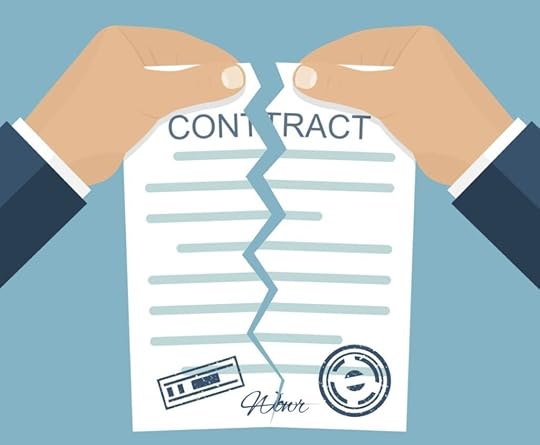Gea Elika's Blog, page 113
July 11, 2018
Contemplating a Non-Contingent Offer

When making an offer on a home in NYC, it’s not always about the price. That’s certainly important, but it’s not everything. Another way to sweeten the deal and get your offer accepted, despite your offer being lower than other buyers, is by making a non-contingent offer. Read on to find out what this is and why you should weight the decision carefully before making one.

Contingent offers
Most real estate purchase contracts will include a clause which makes the sale contingent on specific factors. It can be a mortgage contingency which makes the closing reliant on the seller first getting approved for a mortgage. It can be a home selling contingency in which the deal relies on the buyer’s selling their current home first. Or it can be contingent on specific actions being performed by the sellers. For instance, specific repairs must be completed first before the deal can go ahead.
Whatever the exact details, the contingency is there to protect the buyer’s down payment. If anything happens which causes the deal to fall through the buyer gets their full down payment back.
Making a non-contingent offer
A non-contingent offer is when a buyer agrees to buy without performing any due diligence on the property or making the deal contingent on any outside factors. This can be very risky because if something goes wrong, you could lose your entire down payment. If the sellers have multiple bidders, they may insist on non-contingency contracts. It’s easy to understand why. It provides certainty that the buyer will buy at the offering price. It’s not an ideal situation for buyers but if you’re fully confident that you can close the deal, making a non-contingent offer can put you above other sellers whose offers have contingencies.
Imagine this example. A seller has just listed their property for $500,000. After a few days, two offers are made. The first is for $500,000 but includes a contingencies clause which makes the deal reliant on the buyer first getting mortgage approval. The second offer is for $490,000 but consists of no contingencies. Which do you think has a better chance of being accepted?
Most people will choose the second offer with no contingencies. If you can make a non-contingency offer and have either a mortgage preapproval letter or all the cash on hand you can significantly increase the chances of your offer being accepted. The sellers have the assurance that there will be no unforeseen roadblocks which can derail the deal after the offer has been accepted.
It can be risky
However enticing this might be as a way to get your offer accepted it, of course, carries a lot of risks. If you sign a non-contingent contract and something goes wrong, you stand to lose most if not all of your down payment. Before making such an offer, you should discuss it with your attorney and have them review the offering plan, the buildings insurance and the last two years of your financial history. If they inform you that the building is in bad shape or that you could have problems getting approved for a mortgage DO NOT sign the contract.
If the deal falls through it’s not good for the sellers either. On signing the contract, they will have taken the property off the market (probably losing the opportunity of signing with someone else) and wasted precious time. The buyer and their attorney will face a very tough uphill battle to get any of the down payment back. Non-contingency offers are great for getting above other buyers but only when you are confident that there will be no roadblocks that could derail the deal.
The post Contemplating a Non-Contingent Offer appeared first on | ELIKA Real Estate.
July 9, 2018
Fiduciary Duties by Your Condo or Co-op Board

Some co-op boards are notoriously strict, and there are questions to ask the condo board. However, even in the case of a difficult board member, they owe you a fiduciary duty.
Most boards take this seriously, mainly since it there are legal ramifications for both the board at large and the individual member. But, you should know what this duty entails, and if your board is violating it.

What is a fiduciary duty?
The board must make decisions in good faith, with the shareholders’/unit owners’ best interest in mind. In fact, the board must place these interests above his/her own. The duties are similar to a corporation’s board of directors, which are outlined in New York Business Corporation Law (BCL) section 717.
Since shareholders have given the board special influence and power over the property and the residents’ interest, there is also a unique obligation. This includes acting in good faith, undivided loyalty, and honoring the letter and spirit of the governing documents.
How to recognize a breach
There are obvious cases, such as theft, where the board has not acted in others’ best interest. There are other, more nuanced cases, though. A board member cannot engage in self-dealing, or when he/she gains an advantage that is not available to the other shareholders or unit owners. Anytime a board member gets a special deal or unique treatment, he/she has engaged in self-dealing and has breached his/her fiduciary duty. For instance, if the board member hires a contractor at an inflated price in exchange for doing work on his/her apartment at a below market rate, he/she has breached his/her fiduciary duty. In fact, a board member should not receive anything of value in exchange for services rendered or products purchased.
A board can seem all-powerful, but a member cannot take his/her feelings out against you based on personal issues. This is an abuse of power.
The board also must treat all shareholders or unit owners the same, applying the rules equally. A board member cannot use his position to enforce the rules against some residents, and not apply it to others.
However, merely entering into a bad deal is not a breach of duty. Exercising poor business judgment does not qualify, providing the board acted in good faith. Courts will protect the board in these circumstances. The board can adequately discharge its duties by gathering financial and legal advice from accountants and lawyers. A board member can have a conflict of interest, providing he/she discloses it and there are no special deals. Optically, the board member should abstain from voting on the matter to avoid the appearance of impropriety, however.
Remedies
If you find your board has breached their fiduciary duty, you can file a civil suit against the individual, or even the entire board. It is advisable that you consult with other shareholders or condo owners and seek legal advice. A lawyer will pore over the board minutes, and you can too. Director’ and Officers’ (D&O) liability insurance typically does not cover these types of claims, likely making the board member personally liable for damages.
The post Fiduciary Duties by Your Condo or Co-op Board appeared first on | ELIKA Real Estate.
Breaking a Contract with Your Listing Agent

The decision on whether or not to sell your home is always a big one. If you chose to sell, then the next choice, which can be just as big, is choosing the right seller’s agent. If you do it right by interviewing multiple agents and asking the right questions you should find the right person for the job. But sometimes it doesn’t work out. The agent turns out to be either woefully unprepared for the job, unresponsive in communications, lazy, or even all three. Sometimes circumstances change, and you’ve just decided that maybe it’s not the right time to sell. Whatever the reason, the desired result is the same. You want the contract with the agent terminated. Unfortunately, that’s not always an easy thing to do.

Firing a real estate agent is not like firing an employee
No doubt you’ll have signed an Exclusive Right to Sell Listing agreement with your realtor’s brokerage. This is what makes terminating the contract with your agent so problematic. Each agreement will vary in detail, but in one form or another, it will state that any attempt to change, rescind or modify it must be agreed to by both parties. Depending on how outright bellicose the agent is they could just refuse and leave you stuck with the contract until it expires. However, there are ways to resolve this.
Options for firing your agent
1. Try to work it out
It may be that your agent is not even aware that you are unsatisfied with them. The best way to approach this is by first having an honest conversation with about why you are unhappy. Make it clear that unless some drastic changes are made, you would like to cancel the contract. At the very least, you should give them the courtesy of a chance to make things right. Also, take a moment to ask yourself if whether you’ve been reasonable. Some clients make things more difficult by making unreasonable demands on their agent or refusing to listen to their advice so look in the mirror first.
If it still doesn’t work out, and you have valid reasons for wanting to end the contract, a realtor will often agree to let you off the hook. Of course, this will usually come with a compensation fee that will have been outlined in the contract. How much this compensation is, varies a great deal so be sure to read the contract carefully before signing. But what if they refuse to budge? Well, then there’s option two.
2. Make an appointment with their broker
If on speaking with your agent, they refuse to terminate the contract it’s time to take this a level higher. Go to the manager or owner of their company and make your case for why you want the contract terminated. You should have concrete examples and reasons for why the relationship is not working out, don’t just say you want out because the property hasn’t been sold yet.
Naturally, the owner or manager will try to keep you with the firm by recommending a different agent from the company. If you have already met an agent that you like from another company, you need to make it crystal clear to the owner that you no longer want to work with their company.
However, even at this point, it’s possible that the owner will be just as stubborn as your agent. If you find yourself here, now is the time to delicately explain that you have many friends and family in the area. Mention that it would be bad for all if you felt compelled to speak ill of their firm. Most people will peak up at this and make the smart business decision.
3. Allow the contract to expire
This is the most drama-free option, and the one most people choose. If your agreement is close to its end anyway, it’s usually better to let it before hiring someone else.
The post Breaking a Contract with Your Listing Agent appeared first on | ELIKA Real Estate.
July 8, 2018
Local Law 11: Façade Inspection Safety Program (FISP)

Local Law 11, which is also known as the Façade Inspection Safety Program (FISP), was passed in the wake of several tragedies. It replaced its predecessor, Local Law 10. Both laws were attempts to keep a building’s façade safe to protect pedestrians. Buildings taller than six stories are inspected every five years to make sure items such as bricks, concrete, and other parts of the façade do not fall and hurt people. This covers buildings that are seven stories or higher, but a six-story building with a basement qualifies.

There are over 12,000 buildings subject to the law. As a buyer, you can inquire about the building’s FISP inspection status. We recommend this since it is not hyperbole to state that there are lives at stake, along with financial repercussions.
Why it’s important
The city’s legislature passed Local Law 10 in 1980 in response to a college student’s death from falling stonework. This required inspections every five years, with a pass or fail grade given. The building had to fix major issues, and it was inspected again. Then-Mayor Giuliani signed Local Law 11 in 1998 after several incidents over the years, including a partial building collapse the prior year. This tightened up Local Law 10, adding new requirements to correct the deficiencies from the prior law to increase public safety.
A Local Law is passed by the City Council and becomes part of the city’s building code. Then, the Department of Buildings puts in rules to carry it out.
The new requirements
Previously, the inspector only graded building as pass or fail based on the front façade and side walls up to 25 feet from the street. The current law mandates inspecting all four sides.
The new requirements must include a physical inspection of scaffolding, whereas previously, it was just a visual examination using binoculars or a telescope. The inspector did not have to do an up-close inspection.
It also mandates providing three grades. The report must classify the different façade elements as safe, safe with a repair and maintenance program, or unsafe.
If the inspector deems it safe, there are no issues, and the building is in good condition. The building’s board and management do not have to take any action.
A Safe With a Repair and Maintenance Program (SWARMP) means it is safe, but the building requires repairs and maintenance. While technically safe, the board needs to address these issues quickly. The Qualified Wall Inspector must provide a month and year when these need to get fixed. If the building does not address these issues, the inspector it will push it to the unsafe classification during the next inspection. In fact, a structure does not get two consecutive SWARMP classifications. It becomes either Safe or Unsafe.
A building must address an unsafe classification immediately, and have it repaired within 30 days. Right away, the building must put in protective measures such as a fence or sidewalk shed for the public safety. As part of FISP, the new law also strictly enforces window air conditioning units having supporting brackets. If there are no brackets, the building is deemed unsafe.
After the board receives the inspection work, the city mandates the building to complete a report outlining a timetable which provides deadlines for the work. The Department of Buildings sends it own inspectors and issues citations, which helps it track the cases and push the building to make the repairs promptly.
If the Department, after conducting another inspection, finds the building is not addressing the violations adequately, such as not undergoing the necessary repairs, and the unsafe conditions remain, the building could face the Environmental Control Board, a judicial entity that hears the matter. The building owner could face a penalty of $1,000 per month until the unsafe condition is fixed.
Preventing a dangerous situation
FISP requires owners to have exterior walls inspected on tall buildings. As previously mentioned, this is required every five years, and the building must file a report with the city’s Department of Buildings.
A New York State Registered Architect or Licensed Profession Engineer, called a Qualified Wall Inspector, must stay on the site and conduct the inspection. A junior colleague can do some of the work, but the registered architect or licensed engineer must physically remain to supervise. Previously, under Local Law 10, the professional could sign off on the inspection passing off the duties to a junior colleague. Then, he/she then files the report with the city. There are filing deadlines, which are the building’s responsibility. The current inspection cycle started in February 2015 and runs through February 2020. While the building itself has five years between inspections, there are two-year windows, based on the building’s block number, in which the owner must complete it. These are from February 2015 to February 2017, February 2016 to February 2018, and February 2017 to February 2019.
The inspector must file his/her report within 60 days. This used to take a lot longer. The board should sign off on the report quickly, even if it means calling a special meeting in the summer. If the building fails to file the report, there is a $1,000 per year penalty, and an additional $250 per month late fee.
Why buyers should inquire
If you are contemplating purchasing a co-op or condo unit in a building subject to FISP, you should know the status. A board may not adequately reserve for these repairs, requiring a special assessment on the unit owners/shareholders, or an increase in the maintenance/common charges. Your board should have a plan to deal with the issues, which can become very expensive, and you should inquire about it. This could mean delaying other projects, such as a new roof or community room. Ideally, the board has a maintenance program, alleviating expenses from potential repairs, including those arising from Local Law 11 inspections.
But, the public safety issue is even more critical. You want to make sure your building is safe for everyone, including you and your family.
The post Local Law 11: Façade Inspection Safety Program (FISP) appeared first on | ELIKA Real Estate.
July 7, 2018
Breaking Down the Board Minutes

We have discussed the importance of both you and your lawyer looking over the board minutes when conducting due diligence. However, while the board discusses mundane matters, financial issues and other important items are also brought up. You can uncover clues regarding potential issues, providing you know what and where to look.

While your lawyer reads the minutes as part of his/her duty, we help prospective co-op and condo buyers in order for him/her to also understand the issues prior to making an offer. It can also assist existing owners to keep abreast of the building’s issues, and if there are any festering problems.
Minor issues
The board minutes may contain complaints about the quality of life issues. While a co-op and condo typically have house rules, these may not cover all issues or residents might push the boundaries. Additionally, as a general rule, condo boards are more lenient than their co-op counterparts.
For instance, you might uncover a resident that smokes a lot or complaints about a loud animal. Perhaps it is an isolated incident, or it is part of a larger problem. In any case, the minutes let you know how the board handled the matter and whether you found it satisfactory. The board minutes could also reveal a bug infestation problem.
Major issues
The board also discusses major issues. These include disputes between shareholders/unit owners, lawsuits confronting the building, and major repairs. In the case of a large capital expenditure, you can find out how the board plans on funding it. You may see an increase in your monthly maintenance fees/common charges or the board could charge a special assessment. In extreme cases, the board may mismanage the finances, creating a bad situation down the line.
How far should you go back?
Boards generally keep a historical record of all the minutes from their meetings. We think it prudent that you go back at least a couple of years. If you want to review older minutes, you can since it provides historical context. You can see the issues confronting the board and how these were handled, and whether it remains a problem. We suggest weighing the more recent minutes more heavily, however.
Why bother?
Your lawyer can obtain the minutes from the managing agent in most situations, although not all buildings allow inspection. If there are minutes that you can review, generally, you are not permitted to take these off-site. Therefore, you have to accompany your attorney on the visit, which is typically made via an appointment.
While it is not the most convenient, we suggest making the effort. A board typically meets monthly, and none are usually scheduled in the summer. This provides you with a healthy dose of information to digest. It is important since the minutes provide insight into how the board operates and the living situation in the building. These issues, both financial and social, affect your life. While your lawyer is the expert, you should know the situation, too. You might discover neighbors you find intolerable or a board that you think is unreasonable, which you want to know prior to moving in.
The post Breaking Down the Board Minutes appeared first on | ELIKA Real Estate.
Top Questions for Buyers to Ask When Viewing an Apartment

Home buyers on the hunt for their new home in NYC often fall into the same traps. They only think about what sort of color scheme they will go for, how many people they can invite for cocktail parties and so on. Instead, they should be asking the listing agent more pointed questions about the buildings policies and its legal standing. Whether you’re relocating to the city for the first time or shopping for an upgrade, here are the questions you should ask before signing on the dotted line.

1. How old is the building and when was it last renovated?
New York is certainly known for the beautiful charm of its prewar buildings but there’s a fine line between historic charm and just plain old. When viewing older properties, you should ask how long it’s been since the utility systems – plumbing, wiring, heating – were upgraded. Fail to get the facts on this and your dream home can quickly become a black hole for your wallet. You might also find our article about questions to ask a building management company helpful.
2. What is the square footage of the apartment?
When asking about square footage, keep in mind that there is no universal method for measuring it. It’s important that you know what’s included when you ask for a number (which is usually a rough estimate). There’s the walls-out method where all space, even those taken up by walls is included. Then there’s the walls-in livable space method where the space taken up by walls and non-livable areas (closets and hallways) is excluded. Listing agents will sometimes overestimate the size so the only way to be certain is if you hire a draftsman to measure it for you.
3. How friendly/reasonable is the board?
If you’re scoping out condos and co-op apartments, the board of the building will have a big impact on both the purchase and your living quality. As such, it helps to know if whether or not they are reasonable and friendly. Naturally, if you ask the listing agent this they’ll say very friendly, but you can look for clues in how they said it. This is where having your own buyer’s agent can come in handy. They can ask around and do a little investigating to see if any of the board’s members are capricious or downright bonkers.
4. Is there any pending litigation in the building?
Proceed with extreme caution if there is any legal action being taken against the building. If it’s between the shareholders and the building, things can get highly expensive and unpleasant for all the owners. While larger buildings can often blunt the impact of delinquencies and litigation on their budget, smaller buildings often can’t. This can result in everyone’s common charges going up.
5. Is the building on a ground lease?
Any building on a ground lease does not own the land it is built on. If so, then before proceeding further you should find out when the lease expires and what the renewal terms are. If there are no pre-set terms for renewal and the lease is expiring soon it would probably be better to start looking elsewhere. Renewing a ground lease can be very expensive and if not renewed the entire building could become forfeit.
6. What is the sublet policy for the apartment?
Even if you plan to remain in place for many years it’s important to know what the sublet policy is. The ability to sublet dramatically increases the marketability of the home. It can also be a good source of income if you ever decide to take a long vacation. Make sure to ask for a copy of the sublet application. That way you can see how easy/difficult it would be to sublet should you choose to in the future.
The post Top Questions for Buyers to Ask When Viewing an Apartment appeared first on | ELIKA Real Estate.
July 6, 2018
Dealing With a Difficult Board Member

If one board member becomes dominant and pushes the building’s agenda in the wrong direction, you could find your living status problematic, which may even impact your condo or co-op building’s safety. We have previously discussed strict co-op boards, but you can typically avoid this situation prior to moving in if you find the rules too restrictive.
You do not have to meekly accept a single board member’s decisions. There are ways to recognize the situation and deal with it for your own betterment and that of the entire building.

A dominant member
If you are not a board member, you can read the minutes or perhaps even sit on certain meetings, such as the annual meeting. This is enough to let you know if a member is not participating in a democratic manner, but seeks to dominate the meeting and push his/her own agenda.
Other warning signs include the individual trying to lobby other members, perhaps in one-on-one conversations outside the official meeting. If the board member flouts the rules, this should also raise a red flag. These are out of the ordinary and not within a board’s rules.
The harm
You may wonder if this is a bad thing, particularly if he/she is using this power to advance a common agenda. Problems arise, even with the best of intentions, since the board ceases to function properly and engage in a proper dialogue about the issues. In a worst-case scenario, this director is pushing his/her own agenda, even in conflict with the board’s fiduciary duty.
How to stop a rogue member
A nominating committee can help weed out undesirable board members. However, if he/she already sits on the board, there are various ways to deal with a member that dominates meetings and does not listen to other viewpoints, to the detriment of the building and its residents. The first step is for a trusted resident or board member to discuss the issue with the individual. Perhaps he/she is unfamiliar with how a co-op or condo board works, and needs to better understand how it functions, aside from the responsibilities, duties, and obligations.
If this does not work, the board’s president can strictly follow the meeting’s rules. This could mean following the agenda closely, and cutting him/her off. Of course, the president needs to guard against stifling honest, spirited debate over the issues.
If the individual is violating his/her fiduciary duty, which involves putting the residents’ interests above other interests, even his/her own, the individual is creating a litigation risk. This is potentially even more serious than not living up to his/her responsibilities since there is financial penalty attached to it.
Impeaching a board member is typically a long shot, generally requiring two-thirds of the residents to vote in favor of the action. You can have a coordinated effort to vote the member out when his/her term expires, although that means waiting it out.
A thoughtful approach
When you are voting for your condo or co-op board, go beyond the person’s qualifications. It is also important to consider his/her personality. Think about whether the individual has been part of a large organization, and what kind of reputation he/she has cultivated. There are websites that rate employers which might provide you some additional insight.
Since board members are also residents, generally, board are working for the betterment of the building. Unfortunately, there are times where people seek to take advantage of his/her position, and residents need to quickly take steps in order to stem the situation before it gets out of hand.
The post Dealing With a Difficult Board Member appeared first on | ELIKA Real Estate.
Meaning of “Time is of the Essence” in NYC Real Estate

In some real estate purchase contracts, it’s possible to come across the phrase “time is of the essence.” Usually proceeded by a specific date. This type of legal wording is different from the usual “on or about” when stating the closing date and can have highly unpleasant repercussions when misunderstood. So what exactly does it mean and what are the implications for both parties in a real estate transaction?

The closing date in real estate contracts
In most property sale contracts, the closing date is an approximation rather than a specific deadline. For example, the words “on or about Aug 30,” mean just that. The exact closing date can take place on any date, usually 30 days, before or after this date. This allows a little leeway for both buyer and seller as both parties may have some final things to settle. For instance, Co-op board approval or final renovations. But this can change when the contract includes or implies the “time is of the essence” clause.
The clock is ticking
The “time is of the essence” clause is a phrase in the purchase contract to remind all parties that the clock is ticking. Failure by one or the other party to close at or within that date can result in a breach of the contract and be subject to legal litigation. For it to be valid, the wording must make it clear that failure to close after that date will constitute a breach of the contract. The contract need not state the specific words “time is of the essence” for it to have legal effect. This is provided the notice gives a specific date and warns that failure to perform on that date will result in default.
It’s very rare to see it in the original contract of sale. If included, it must be agreed on beforehand with both parties to be valid. The more common way it pops up is if one party misses the closing date. The other party’s lawyer can then send a “time is of the essence” notice to close on a new date. Provided they give a reasonable adjournment period. Such notice will supersede the actual contract and can be sent by either party. In a buyer’s case, failure to close by the date given can result in forfeiture of the down payment. For sellers, they can be sued for the return of the down payment and any costs incurred by the buyers for the delay.
Time is of the essence for new developments
Buyers face some difficulties with this when it comes to new constructions. (Buildings that have yet to finish construction or are not approved yet for occupancy). So long as a Temporary Certificate of Occupancy has been issued, and an offering plan declared effective, a sponsor can issue a “time is of the essence” notice.
The problem this presents for buyers is that they can be presented with the notice out of the blue. Often after they’ve signed the contract months or even years before. Depending on how your attorney has negotiated the deal you may have the right to adjourn for ten to fifteen days. Buyer should be ready to close at any time once the building has completed construction, they have received a Temporary Certificate of Occupancy and have had the offering plan declared effective. The sponsor can then send a ”time is of the essence notice” with as little as 30 days to spare.
Final Thoughts
In general, a “time is of the essence” clause is more beneficial for the seller than the buyer as they have the assurance that there will be no delay. But it can also cause problems for sellers as the contract may require that they have a certificate of occupancy, or have made certain repairs before the sale can take place. If they cannot close on the “time is of the essence” closing date, they can be deemed in default and liable for damages. As such, it’s better to hold off on including the clause unless as a last resort.
The post Meaning of “Time is of the Essence” in NYC Real Estate appeared first on | ELIKA Real Estate.
July 5, 2018
Renewing Your Lease Without a Rent Increase

As we enter July, we also enter the peak rental session in NYC. If your lease will soon be up for renewal you should be prepared for a potential rent increase. This is something just about every New York tenant experiences at one time or another. Such increases are partly driven by increased operating costs for landlords and, the thinking goes, landlords expect that after your first year you’ll be too broke or lazy to move again. Fortunately, it is possible to negotiate how much it increases.

The need-to-know on lease renewals
At present, owners of buildings with rent-stabilized apartments can only raise their rents by a certain amount each year. For one-year leases, it’s up to 1.25% while for 2-year leases it’s 2% until September 30th, 2018. Recently, the Rent Guidelines Board approved changes to these increases which will take effect from October 1st, 2018 until September 30th next year. From then, it will 1.5% for one-year leases and 2.5% for 2-year leases. For market-rate apartments, landlords can raise the rent as much as they like.
Now is a good time to negotiate for a smaller increase as landlords have had a tough time this year. Let’s face it, they don’t want you out, they just want more money. Provided you’ve been a good tenant, they don’t want you to leave as this will mean a loss while they search for a new tenant. The key in these types of negotiations is to find a solution that keeps both you and the landlord happy. Every situation is different so it’s up to you in deciding how long to drag out negotiations or whether to accept a final offer or not. Whatever the case, here are some tips to help your case.
1. Be calm and stay respectful
Leave the baseball bat at the door, threats and stern language will do you no good here. Instead, be calm, respectful and make a good opening in finding a compromise. Something along the lines of “I’ve been a respectful tenant for X amount of time and have always paid my rent on time. I enjoy living here and wish to continue but the proposed increase is far too high for me to pay. I would like to discuss the terms and find something that we can both be happy with.” A phone call or email is usually a good start. If that doesn’t get a response, go in person to pay next month’s rent.
2. Stress how good of a tenant you’ve been
The qualities of a good tenant are more in what you don’t do. Point out that you’ve always been on time with rent, have never received a complaint from the neighbors or broken so much as a teacup. If you have done any of these things, it’s probably best not to bring them up.
3. Research the market
Find out if property prices have gone up or down in your neighborhood through borough specific market reports. If you’ll be paying more than market value after the increase this can be a big tipping point. Coming to negotiations armed with numbers puts you in a much stronger position then the tenant who has little else but a sad story.
4. Ask for concessions
Concessions and upgrade are far easier to acquire than price changes. Would you be willing to pay the increased rent if the landlord agreed to replace some fixtures? What about a bathroom renovation? If they won’t budge on the money this can be a good chance to weasel something else out of them.
5. Offer money up-front
This is unlikely to work with large companies or the super-rich. But for smaller companies and families, a few hundred in the bank now is usually better than a grand spread out over one year. In exchange for a lower rent increase, offer to pay.
The post Renewing Your Lease Without a Rent Increase appeared first on | ELIKA Real Estate.
July 4, 2018
Boost Your Credit Score Fast

Purchasing a home is always an exciting time for both first-timers and veterans alike. But for first timers, the thought of their credit score tends to worry them more. Like it or not, your credit score (sometimes referred to as your FICO score) dictates a lot. Whether you’re seeking approval for a credit card or trying to get a reasonable rate on a mortgage. Boosting your credit score is not something that happens overnight. But with a few easy and straightforward tricks you can get those digits up reasonably fast.

The importance of good credit
If you’re looking to become a homeowner but in need of financing your credit score will make or break your loan application. These days you’ll need a minimum credit score of at least 580 if applying for an FHA home loan. But poor credit, even when it meets the minimum requirements, will mean higher interest rates.
A score of over 700 is considered good while one over 800 is seen as excellent. If your three digits don’t break 700, then you’re not alone. The national average is 695 with less than half falling in the favored 700-plus range. FICO scores are based on an algorithm with the numbers going up and down based on the numbers crunched. The good news is that you can bring those numbers and your credit score up. Here are six ways you can do so.
1. Find and address credit card errors
In some cases, it’s not your fault if your credit score is low. Creditors sometimes make mistakes in their reports, at least one in four according to the Federal Trade Commission. Before doing anything else, request a report from each of the three nationwide credit reporting companies (Equifax, Experian, TransUnion) at Annual Credit Report. By law, you’re entitled to one free report a year. If you find anything unusual – say, a falsely reported late payment or unpaid bill – the report should tell you where to send the dispute. Once the error is corrected, you should see an immediate boost in your credit score.
2. Have activity on your credit report every month
Having no credit history is just as bad as having a low FICO score. With 35% of your score based on payment history, it is vital that you have a paper trail. The cheapest and easiest way to build and maintain your score is through the use of a credit card. This doesn’t mean you need to make large purchases on a regular basis. Just one or two purchases by card a month (it can be as little as a loaf of bread). Then make sure you pay the statement balance in full and on time every month.
3. Keep your utilization low
Your credit score depends not just on what you owe but on what you owe compared with your credit limit, a ratio known as credit utilization. For example, if you have a $4,000 balance on your card with an $8,000 limit, your credit utilization is 50 percent. There are a few theories on what the best credit utilization level is, but most agree that it should be no more than 30 percent. A card that is continually being maxed out is a red light for either a lack of control or financial hardship.
4. Get your bills current
You typically have 30 days to make a payment so If you’re running late on one try to get it paid ASAP. Even if you’ve already passed that mark the sooner, you pay it; the less damage is done. If you’ve had a bad run of missing payments in previous months, you can fix the damage by immediately switching to paying all bills on time. After 2-3 months you should see an improvement in your credit score.
5. Become an authorized user
Do you know someone you trust completely and is good at managing money? If so, and they’re willing to let you become an authorized user, then their account will show up on your credit report. As a result, your credit score gets a boost from their on-time payments and (hopefully great) credit utilization rate. Just make sure you choose someone who do pay their bills on time and keeps a low debt. Bad credit history will show up just as much as good.
6. Remove bad credit reports
As with a lot of things, there’s always room for negotiation. Creditors don’t like unpaid bills anymore then you do. You have the option of getting your lousy behavior removed from your credit report by presenting them with a “pay for delete offer” in exchange for making the full payments. If it’s not possible for you to make the total payments now, negotiating for installment payments in another option.
These six strategies may be straightforward but keep in mind that ‘fast’ is a relative term. Rome wasn’t built in a day nor was it destroyed overnight. Give it a good 2-3 months before you start seeing results.
The post Boost Your Credit Score Fast appeared first on | ELIKA Real Estate.



